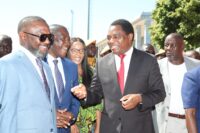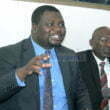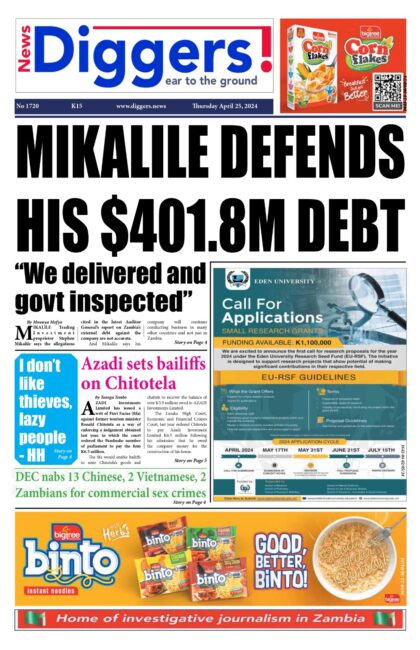Felix Mutati made a personal decision and he communicated that decision to me and other colleagues that he did not have the zeal to continue fighting for his legitimacy and that he was looking to options outside the MMD, says Raphael Nakacinda.
In an interview, Nakacinda, the former MMD national secretary, who is now a nominated member of parliament, complained that the High Court ruling, which recognized Nevers Mumba as the legitimate MMD president was a direct assault to the former ruling party’s constitution, which required that the party held a convention every five years.
“So, for me and my colleagues who were also defendants (namely) Honourable George Kangwa, Honourable Mwansa Mbulakulima, who was also a defendant, of course, we know that he is PF now and, therefore, to continue carrying him as a defendant may not…he hasn’t got a direct interest in MMD now (but we) are challenging on that basis. Honourable Felix Mutati made a personal decision and he communicated that decision to me and to some colleagues (on) how he didn’t have a zeal to continue on this path. And I think he was looking out to options outside the Movement for Multiparty Democracy and I think that decision is respected. So, if he decides to make a personal decision in that nature, there is nothing we can do. We can only wish him well in terms of his new prospects, politically. But for us, we are committed not only to fight for the MMD, but also to fight for the principle of the rule of law in political parties because it’s through political parties that leaders emerge to become national leaders,” Nakacinda said.
“So, this decision, basically, is a direct assault to those provisions of the constitution. We know that there is a matter by way of a petition in the Constitution Court, but I think that this decision that the High Court made also puts the matter that is before the Constitutional Court in a situation. So, we are creating a contradiction within the Judiciary. Possibly the (High) Court should have held its ruling awaiting for that petition in the Constitutional Court to be concluded, which was going to inform the High Court on whether or not it can even go to the extent of declaring that Dr Mumba can remain in office. That distortion is what is motivating us and inspiring us to appeal so that the correct thing is done.”
He added that his decision to challenge the court ruling should not be viewed as that of trying to settle scores with Mumba, but about advancing principles.
“You have also heard in PF, our colleagues that we are working with, there have been sentiments of people saying ‘there is no need to go to a convention (because) we already have a candidate: President Edgar Lungu.’ I may not be opposed to President Lungu being a candidate, but don’t you think that all of us as political leaders are supposed to always undertake a process of accountability within our political parties just like we account every five years with the electorate? So, this issue must not be viewed from what has been attempted to be done and that is to create an impression that there are possibly personal conflicts and people are trying to settle scores, but it is about advancing principle,” Nakacinda argued.
He insisted that he did not agree with the ruling.
“The inspiration (to appeal the court decision) arises from the fact that we do not agree with the judgement. We do not agree to the extent that first of all, the learned judge did find the fact that all suspensions and expulsions that were meted out by Dr Mumba and his clique were basically illegal. And if something is illegal, it cannot become legitimate or made legal by non-actions of those who are victims of those illegal acts. And we were before a court, which should have pronounced itself as to declare those illegal or irregular suspensions or expulsions null and void,” Nakacinda said.
“Number two, against the word of evidence, we saw the honourable court going ahead as to declare Nevers Mumba as president. That is an import in our view of illegality within the party because the constitution of the party is very clear about the tenure of office for office bearers, particularly NEC members, and it is a five-year term. So, five-year terms, in this case, is from 2011 to 2016 because the National Executive Committee that was elected in 2011 was the one that Dr Mumba was joining to become equally a member of that NEC, and if he was a member of that NEC, it means that his tenure is co-terminus with that of the National Executive Committee. So, those fundamental findings cannot be ignored. And in this case, what term of office is Dr Mumba being awarded?”
Nakacinda also said the MMD membership had spoken loudly about how they wanted to be governed and the type of leadership they were looking for.
“And in terms of precedence, what are we saying to our political landscape of our country? Does it imply that if somebody is in leadership, all they need is to use tricks, dubious activities to silence the voice of divergent views and mete out illegal actions like suspensions and expulsions all in the quest of self-preservation, and that they can go to court and use technicalities to silence the voice of the majority? Are we not living in the same environment to know, clearly, that the members of the Movement for Multiparty Democracy have spoken loudly about how they want to be governed and the type of leadership they are looking for?” Nakacinda asked.
He said Mumba equally knew that if the judgement, which confirmed him as party president was not challenged, it would affect how other political parties would conduct themselves.
“He (Mumba) is also appreciating that being the mother of democracy, if that judgement is not challenged, it speaks to how other political parties will conduct themselves. In this case, the UPND, for example, have not been to a convention from 2006 and we don’t see them having the desire to proceed to the convention. And by that judgement, it means that the National Management Committee of the UPND can decide against the provision of their constitution, which demands that they go to a convention every after five years; they can decide not to go to a convention, which in this case, would be legitimate by the precedent set by that judgement. So, if you are not challenging it…it’s not just about MMD, we are also distorting our governance institutions, particularly political parties,” said Nakacinda.











